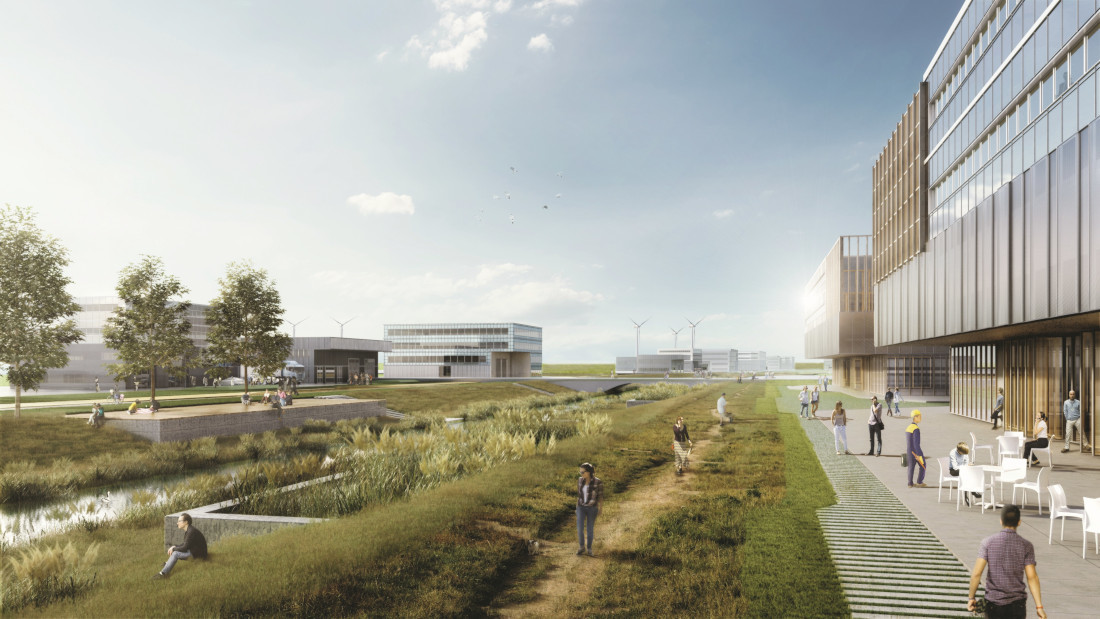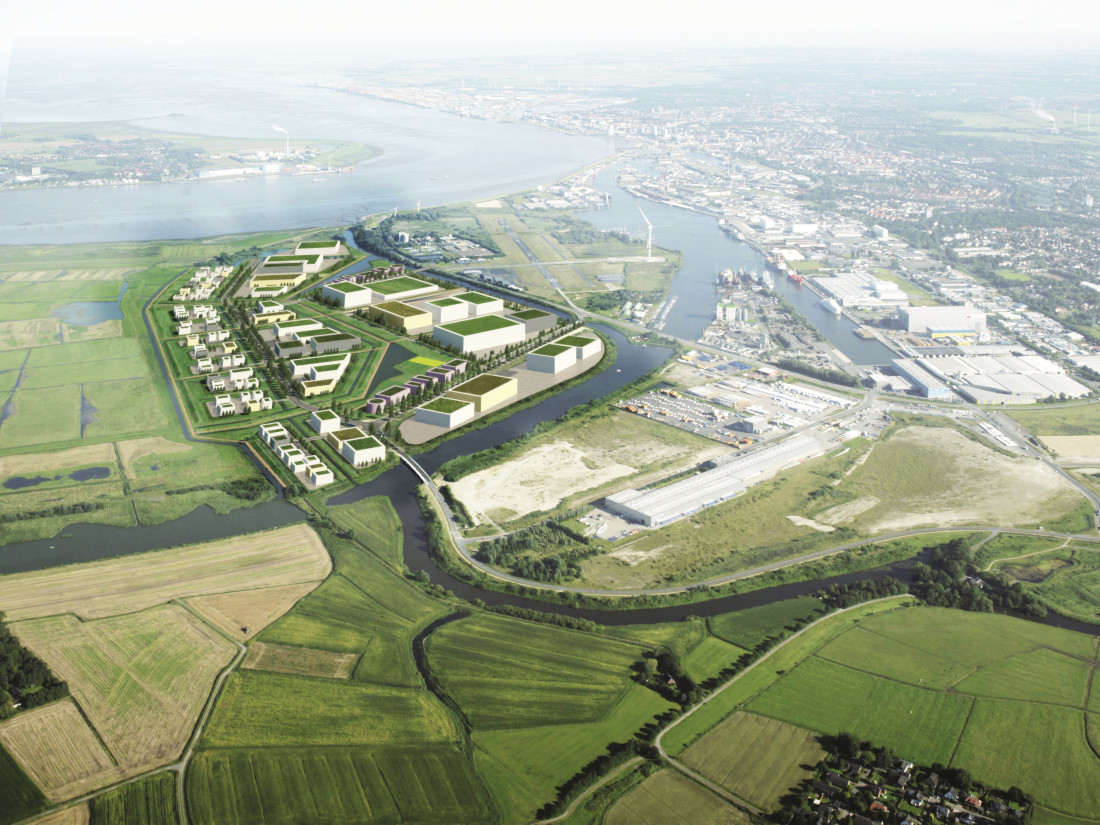Work and business in harmony with nature
NewsBusiness park designed for the green economy is the first of its kind in Germany

The 150-hectare business and industrial park LUNE DELTA is being developed in strict accordance with sustainability and environmental protection criteria. The aim is to create conditions that allow companies to operate at an internationally competitive level while at the same time minimising their environmental and social impact. The project is currently at the development planning stage.
Bremerhaven takes a fresh approach
In 2010, Bremerhaven increased its municipal area by almost a fifth through a transfer of land from Lower Saxony. The majority of this land was designated as an ecological compensation area for the construction of the CT4a container terminal, with a section earmarked for commercial use. Now, the BIS, Bremerhaven’s economic development agency, is presenting plans for the sustainable development and use of these 150 hectares in harmony with the adjacent nature conservation area. “The new LUNE DELTA business and industrial park is an excellent example of how we intend to combine commercial, environmental and social objectives. This is the only way in which we can master the challenges of climate change while further increasing our competitiveness,” explains Bremerhaven’s mayor, Melf Grantz. With the LUNE DELTA site, Bremerhaven aims to offer a suitable location for both new and established companies from a broad section of the green economy. Annette Schimmel, who coordinates the project at BIS, is keen to point out that mandatory sustainability criteria will apply at the site. The plan is to certify LUNE DELTA according to the standards of the German Sustainable Building Council (DGNB). The DGNB will award the project a preliminary certificate at the 2019 Expo Real property trade fair in Munich this autumn.
A great future for sustainable businesses
For around 20 years, Bremerhaven has been one of the pioneers in developing and building equipment for renewable energies. Leading research establishments, such as the Alfred Wegener Institute Helmholtz Centre for Polar and Marine Research and the Fraunhofer Institute for Wind Energy and Energy System Technology (IWES) are based here. A number of firms, from a mid-sized timber merchant and a four-star hotel to a major frozen food manufacturer, have recognised the economic and environmental significance of sustainability for themselves and have undergone or are initiating the necessary transition to a way of doing business that protects resources and combats climate change. “It makes sense to further encourage the green economy with a dedicated business park,” says Schimmel. After all, green technologies have huge potential. According to the Federal Environment Ministry’s estimates, German green tech companies will double their revenue from €344 billion in 2013 to €740 billion in 2025.
Good infrastructure creates a competitive edge
Among the special factors envisaged for the design of the planned business and industrial park is a utilities concept based on renewable energies that encourages pilot projects of relevance to the energy systems of the future. For example, there are plans to convert wind energy into green hydrogen nearby and for a test field where hydrogen is created through electrolysis – the first so far in Germany. A large green space at the heart of the site will be transformed into a park, where rainwater will be captured in ditches and ponds. The park will also feature a shared leisure and recreation area. In addition, a start-up centre focused on the green economy is intended to act as an incubator for new forms of shared and networked businesses. There will also be site management to control material flows to save resources and reduce costs.

Scientists in Bremerhaven are looking forward to their new neighbours
The principal ideas of the project are already meeting with expert approval. “We are happy to put our expertise at the disposal of the planners and developers. And we are also open to dialogue and collaboration with companies that are setting up on the LUNE DELTA site,” says the head of IWES, Professor Andreas Reuter. The LUNE DELTA project is due to be implemented from 2021. But the first prospective tenants are already expressing an interest, not least due to the broad range of options available. The site is intended for companies from virtually all of the green sectors, from energy technology through logistics to information technologies and beyond.
Attractive working environment for highly skilled staff
The detailed workings of the LUNE DELTA site are no less exciting, from car sharing arrangements and shared workshops to communal facilities such as childcare centres, and nearby recreational and leisure facilities for people who work there or live in neighbouring districts. Schimmel hopes that this package and the internationally renowned research community in Bremerhaven will also draw technology companies with highly skilled staff to the LUNE DELTA: “We are creating the type of highly attractive environment that is becoming increasingly important given the current skills shortages.”
A beacon project for Germany as a whole
“Bremen sees the development of the LUNE DELTA site as a beacon project with an impact far beyond the borders of our own federal state. The business, science and research communities are cooperating closely even at the planning stage,” says Bremen’s Senator for Science and Ports, Dr Claudia Schilling. There is also much praise from the Council for Sustainable Development, an advisory body commissioned by the German Federal Government. “LUNE DELTA is a prime example of urban development of the future,” according to council member Professor Wolfgang Schuster. The former mayor of Stuttgart explains that the project fulfils a number of the 17 sustainable development goals set out by the United Nations. “That makes the development a beacon project for Germany as a whole,” says Schuster.
Success Stories
Letters from Turkey: Spring 2021 Edition
Holidaying in Turkey in 2021 – might that be possible? How has the Corona crisis affected the Turkish economy? You'll find all this and more in our Spring 2021 country reports.
Learn moreLetters from Vietnam – Spring 2021
The opportunities and risks of doing business in Vietnam and Germany's smallest Federal State on the big stage that is Vietnam – these are some of the topics in our Spring 2021 regional report.
Learn moreLetters from China: Spring 2021 Edition
Gifts of digital money from the government and a region with opportunities for German companies – just some of the points covered in our China newsletter.
Learn more
